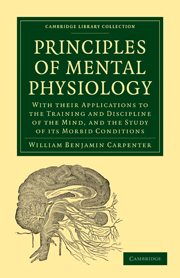 Principles of Mental Physiology
Principles of Mental Physiology Book contents
- Frontmatter
- PREFACE
- Contents
- BOOK I GENERAL PHYSIOLOGY
- BOOK II SPECIAL PHYSIOLOGY
- CHAPTER X OF MEMORY
- CHAPTER XI OF COMMON SENSE
- CHAPTER XII OF IMAGINATION
- CHAPTER XIII OF UNCONSCIOUS CEREBRATION
- CHAPTER XIV OF REVERIE AND ABSTRACTION:—ELECTRO-BIOLOGY
- CHAPTER XV OF SLEEP, DREAMING, AND SOMNAMBULISM
- CHAPTER XVI OF MESMEBISM AND SPIRITUALISM
- CHAPTER XVII OF INTOXICATION AND DELIRIUM
- CHAPTER XVIII OF INSANITY
- CHAPTER XIX INFLUENCE OF MENTAL STATES ON THE ORGANIC FUNCTIONS
- CHAPTER XX OF MIND AND WILL IN NATURE
- APPENDIX. DR. FERRIER'S EXPERIMENTAL RESEARCHES ON THE BRAIN
- INDEX
CHAPTER XVII - OF INTOXICATION AND DELIRIUM
Published online by Cambridge University Press: 29 August 2010
- Frontmatter
- PREFACE
- Contents
- BOOK I GENERAL PHYSIOLOGY
- BOOK II SPECIAL PHYSIOLOGY
- CHAPTER X OF MEMORY
- CHAPTER XI OF COMMON SENSE
- CHAPTER XII OF IMAGINATION
- CHAPTER XIII OF UNCONSCIOUS CEREBRATION
- CHAPTER XIV OF REVERIE AND ABSTRACTION:—ELECTRO-BIOLOGY
- CHAPTER XV OF SLEEP, DREAMING, AND SOMNAMBULISM
- CHAPTER XVI OF MESMEBISM AND SPIRITUALISM
- CHAPTER XVII OF INTOXICATION AND DELIRIUM
- CHAPTER XVIII OF INSANITY
- CHAPTER XIX INFLUENCE OF MENTAL STATES ON THE ORGANIC FUNCTIONS
- CHAPTER XX OF MIND AND WILL IN NATURE
- APPENDIX. DR. FERRIER'S EXPERIMENTAL RESEARCHES ON THE BRAIN
- INDEX
Summary
533. There is no class of aberrant Mental phenomena which is more deserving of careful scientific study, than that which is produced by the introduction into the Blood of substances which are foreign to its composition, and which have the special property of perverting its normal action on the Brain. For, in the first place, these phenomena bring into strong relief the contrast between that augmented automatic activity of the Cerebrum, which manifests itself in the rapid succession of thoughts, the vividness of images, and the strong excitement of feelings,—and the diminished volitional control, of which we have the evidence in the incoherence of thought, the incongruity of the imaginary creations, and the extravagance of the feelings. And in the second place, it is perfectly clear that this disturbance of purely psychical action, affecting not merely what may be regarded as the functions of the Brain, but the exercise of that attribute of Man's nature which seems most strongly indicative of a Power beyond and above it (§ 26), is produced by agencies purely physical. For it is not only that the balance between the automatic activity of the Brain, and the directing and controlling power of the Will, is disturbed by the exaltation of the former, so as to give it a predominance over the latter. On the contrary, the absolute weakening of Volitional control is clearly a primary effect of these agencies; being as strongly manifested when the automatic activity (as often happens) is reduced, as when it is augmented.
- Type
- Chapter
- Information
- Principles of Mental PhysiologyWith their Applications to the Training and Discipline of the Mind, and the Study of its Morbid Conditions, pp. 636 - 656Publisher: Cambridge University PressPrint publication year: 2009First published in: 1874


